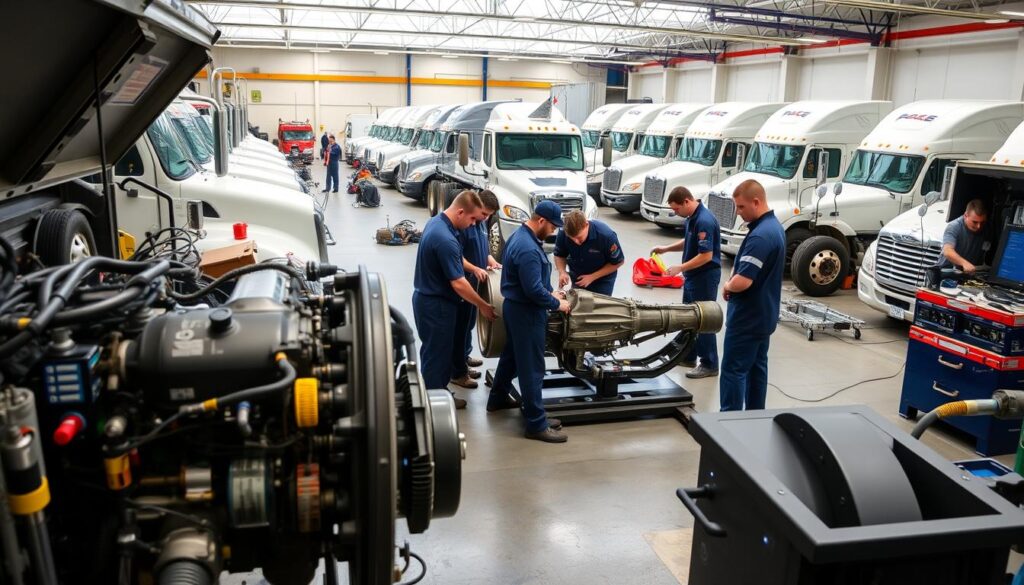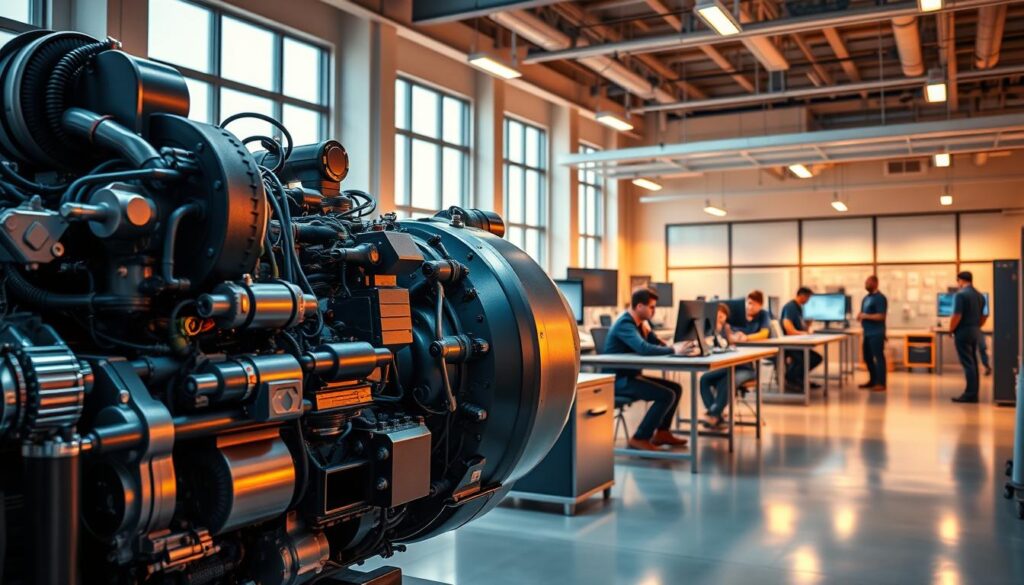Ever wondered why skilled professionals in the diesel industry are always in demand? With industries like trucking and power generation relying on heavy-duty engines, trained technicians play a crucial role in keeping operations running smoothly.
Starting a career in this field requires specialized training and certifications. Accredited programs, such as UTI’s 45-week Diesel & Industrial Technology curriculum, provide hands-on experience in engine repair and preventative maintenance.
Employers look for expertise in transport refrigeration and familiarity with industry standards. Earning ASE certifications or completing manufacturer partnerships, like the Cummins Engines Program, can significantly boost job prospects.
Key Takeaways
- Skilled diesel technicians are essential in high-demand industries.
- Accredited training programs offer hands-on experience.
- Key skills include engine repair and preventative maintenance.
- ASE certifications enhance career opportunities.
- Manufacturer partnerships provide specialized knowledge.
Why Pursue a Career as a Diesel Mechanic?
The transportation sector thrives on skilled professionals who keep diesel-powered fleets running. From freight trucks to industrial equipment, these engines drive the economy. With specialized training, technicians secure roles in a recession-resistant industry offering growth and financial rewards.
High Demand for Diesel Technicians
Over 92% of freight transportation relies on diesel engines. An aging workforce creates 43,000+ annual job openings nationwide. Advanced roles, like Master Technician, see 77% growth due to evolving technology.
Competitive Salary and Job Stability
The median annual salary for diesel technicians reaches $55,754, with top earners surpassing $70,000. Employers often fund certifications, like UTI’s MSAT programs, to retain talent. The Bureau of Labor Statistics projects 4% industry growth through 2032, ensuring long-term opportunities.
Steps to Become a Diesel Mechanic
The path to mastering diesel engines combines education, experience, and certifications. Accredited programs and hands-on labs provide the technical foundation needed for this high-demand field. With dedication, technicians can advance from entry-level roles to specialized positions in just a few years.
Complete a Diesel Technology Program
Enrolling in a diesel technology program is the first critical step. Schools like UTI offer a 45-week core curriculum covering engine repair, diagnostics, and preventative maintenance. Specializations, such as the 12-week Cummins Engines add-on, deepen expertise in specific systems.
Gain Hands-On Experience
Training hands-on is essential for mastering real-world challenges. Programs blend online theory with 700+ lab hours, like those at UTI’s Houston campus. Internships with industry partners, such as Peterbilt or Freightliner, provide 6-8 months of practical work.
Earn Industry Certifications
Technicians who earn certifications stand out to employers. ASE credentials, like the T2 Diesel Engine Repair, validate skills within the first two years. Advanced roles, such as Master Technician, often require 3+ certifications and 5-7 years of experience.
Diesel Mechanic Training Programs
Quality training programs lay the foundation for success in diesel technology careers. Accredited schools offer flexible formats, from accelerated courses to associate degrees, tailored to fit busy schedules. Hands-on labs and industry partnerships ensure graduates meet employer demands.

Program Length and Structure
Programs vary in duration to match career goals. UTI’s Houston campus delivers a 45-week intensive curriculum, with new classes every 3–6 weeks. In contrast, San Jacinto College offers a 2-year AAS degree or a 1.5-year certificate for faster entry.
Blended Learning: Online and Hands-On Labs
Blended learning models combine digital theory with practical labs. UTI’s 50/50 split includes 700+ lab hours across 18 modules. Evening and weekend options at campuses like Miramar cater to working students.
Core Curriculum Topics
Key courses prepare technicians for real-world challenges:
- Hydraulic Systems: Troubleshooting pumps and valves.
- Electronic Controls: Diagnosing engine management systems.
- Transport Refrigeration: Maintaining climate-control units.
Manufacturer-funded MSAT programs, like those with Cummins, reduce tuition while specializing skills.
Skills You’ll Learn in Diesel Training
Modern diesel training equips students with high-demand technical skills for today’s workforce. Programs blend classroom theory with hands-on labs using industry-standard tools. Graduates master competencies that employers value across transportation and logistics sectors.
Diesel Engine Repair and Maintenance
Engine rebuilds form the core of most training programs. Students work with Caterpillar and Cummins OEM tools to disassemble, diagnose, and reassemble power units. The UTI curriculum includes specialized modules on Freightliner ABS and transmission overhauls.
Preventative maintenance diesel procedures extend engine lifespan. Technicians learn oil analysis, filter replacement, and coolant system servicing. San Jacinto College’s program emphasizes fleet management scheduling techniques.
Electrical and Hydraulic Systems
Modern electrical systems require advanced diagnostic skills. Multimeters and software like Detroit Connect help troubleshoot wiring faults. Hydraulic training covers pump repairs and valve adjustments for construction equipment.
Programs incorporate 700+ lab hours on electronic control modules. Students practice reading schematics and testing sensors. This hands-on approach prepares technicians for dealership and fleet roles.
Transport Refrigeration and Preventative Maintenance
EPA-certified transport refrigeration training meets cold chain logistics demands. Courses cover compressor repairs and refrigerant handling. Graduates qualify for roles maintaining climate-controlled trailers.
Welding modules teach exhaust system fabrication and aftermarket upgrades. These secondary skills increase job opportunities in customization shops. Programs balance immediate employability with long-term career growth potential.
Diesel Mechanic Certifications
Industry-recognized credentials open doors to higher-paying roles and specialized positions. Technicians with validated expertise command 22-35% higher salaries than uncertified peers. Employers often cover testing fees for top performers.
ASE Certifications
The National Institute for Automotive Service Excellence offers eight ASE certification paths for diesel specialists. The T2-T9 series covers everything from engine repair to hybrid systems. UTI graduates can substitute training for one year of required work experience.
Key credentials include:
- T2 Diesel Engine Repair: Cylinder head rebuilding and turbocharger diagnostics
- T4 Brakes: ABS troubleshooting for Freightliner and Volvo systems
- T8 Preventative Maintenance: EPA-compliant inspection protocols
Manufacturer-Specific Advanced Training
MSAT programs provide brand-focused expertise through employer partnerships. Cummins Engines Program graduates gain warranty repair authorization, doubling job opportunities. Select campuses offer 100% funded training in Peterbilt MDEC and Freightliner CAC systems.
Cummins Engines Program
This 12-week advanced training focuses on X15 and B6.7 engine platforms. Students learn electronic fault tracing using Insite software. Graduates receive direct referrals to Cummins dealerships nationwide.
Continuing education maintains certification validity. Technicians must complete industry certifications updates every five years, including EPA 609 refrigerant handling recertification.
Specialized Diesel Technician Training
Cutting-edge programs prepare technicians for evolving industry demands. Specializations in diesel trucks, marine engines, and heavy equipment create pathways to high-growth roles. Corporate-funded training reduces costs while accelerating expertise.

Advanced Programs for Diesel Trucks and Engines
UTI’s 12-week Cummins Engines Program dives into X15 and B6.7 platforms. Students master electronic diagnostics using Insite software. Graduates qualify for dealership roles with direct referrals.
Other niche options include:
- Marine Diesel (MTU): Focused on ship propulsion systems.
- Mining Equipment (Komatsu): Covers hydraulic and aftertreatment systems.
- Hybrid-Electric Powertrains: Prepares for green technology shifts.
Industry Partnerships and Funding Opportunities
Industry partnerships like Ryder and Penske offer apprenticeships with tuition coverage. San Jacinto College’s Crane Tech program includes OSHA certifications for heavy equipment roles.
Key benefits:
- Corporate sponsorships cover 60–100% of MSAT tuition.
- Earn forklift/OSHA credentials alongside core training.
- Priority hiring for graduates of manufacturer-backed advanced programs.
Career Opportunities for Diesel Technicians
The diesel industry offers diverse career opportunities for skilled technicians. With over 43,000 annual job openings nationwide, qualified professionals can choose from various roles across multiple sectors.
Entry-Level Diesel Jobs
Entry-level diesel positions provide hands-on experience while earning competitive wages. Fleet mechanics typically start at $42,000 annually, while field service technicians average $48,000.
Many graduates secure roles within six months of completing training. Common first jobs include maintenance technicians at trucking companies or equipment service assistants at dealerships.
Advanced Career Paths
Specialized advanced career paths offer higher earning potential. Master technicians earn approximately $68,000, while shop foremen can make $75,000 or more.
Emerging fields like EV charging infrastructure and hydrogen fuel cells create new opportunities. Government and military contracts often require security clearances but offer stable employment.
Industry Growth and Job Openings
The Bureau of Labor Statistics projects steady growth for diesel specialists. Technicians with manufacturer certifications advance 22% faster than their peers.
Major employers include freight companies, construction firms, and public transit agencies. Specialized roles in marine and mining equipment continue to expand nationwide.
Salary Expectations for Diesel Mechanics
Skilled technicians in this field enjoy competitive compensation packages. The median annual salary in Texas reaches $55,754, with experienced professionals averaging $28.93 hourly nationwide. Earnings vary based on location, specialization, and employer type.
Regional and Industry Variations
Alaska offers the highest wages at $65,000, while Florida averages $51,000. Overtime opportunities add $8,000–$15,000 annually. Union shops pay 12–18% more than non-union counterparts.
Specialty Premiums and Benefits
Refrigeration specialists earn +$4/hour, and mining equipment techs gain +$6/hour. Benefits packages often include $12,000–$18,000 in health and retirement contributions. Employer-sponsored training further boosts long-term earning potential.
Where to Find Diesel Mechanic Programs
Multiple pathways exist for those pursuing expertise in heavy-duty engine systems. Accredited diesel mechanic schools range from national chains to local technical school options. Choosing the right fit depends on career goals, location, and learning preferences.
UTI’s Nationwide Training Network
Universal Technical Institute operates 12 UTI campuses across the U.S., including Houston, Dallas, and Orlando. Their 45-week core program includes 700+ lab hours and manufacturer partnerships like Cummins.
Key advantages of UTI:
- Housing assistance at residential campuses
- VA benefits acceptance for veterans
- Virtual tours for Houston and Avondale locations
Community College and Technical School Alternatives
Local community college programs offer cost-effective alternatives. San Jacinto College’s North Campus provides both AAS degrees and shorter certificates. These technical school options often have articulation agreements with employers.
Benefits of regional programs:
- Lower tuition rates for in-district students
- Evening/weekend classes for working adults
- Direct pipelines to regional dealerships
Prospective students should compare UTI campuses against local community college curricula. Both pathways prepare graduates for ASE certifications and entry-level roles.
How to Get Started Today
Launching your journey is easier than you think. Accredited programs offer flexible enrollment process options and robust financial aid packages to help you get started quickly.
Simple Enrollment, Maximum Support
The four-step process takes less than a week:
- Submit your application—24/7 online access with instant approvals.
- Complete FAFSA—UTI accepts federal aid and offers $15M+ in annual scholarships.
- Attend orientation—Tour labs and meet instructors.
- Secure your toolkit—Essential gear for hands-on training.
Veterans qualify for GI Bill® funding, while MyCAA covers military spouses.
Upcoming Class Schedules
New cohorts begin every 3–6 weeks nationwide. Manufacturer-sponsored groups have priority deadlines—apply early for programs like Cummins Engines.
Evening and weekend slots fill fast. Use UTI’s virtual tour to explore Houston or Orlando campuses before committing.
Conclusion
Skilled professionals in engine technology enjoy strong job security and earning potential. With training certification programs as short as 45 weeks, graduates often secure roles paying $55,000+ annually.
Over 43,000 positions open yearly nationwide, creating urgency for qualified candidates. Explore hands-on programs at UTI Houston or San Jacinto College to jumpstart your diesel mechanic career.
Lifetime career services support certification renewals and advancement. The November cohort deadline approaches—get started today to secure your spot in this high-demand field.
FAQ
What education is needed to work in diesel technology?
Completing a diesel technology program at a trade school or community college provides essential training. Many employers prefer candidates with formal education in diesel engines, electrical systems, and hydraulic repair.
How long does diesel mechanic training take?
Programs typically last 9-12 months for certificates and up to 2 years for associate degrees. Hands-on labs and accelerated courses can help students graduate faster.
What certifications boost a diesel technician’s career?
ASE certifications and manufacturer-specific programs like Cummins Engines or MSAT validate skills. These credentials often lead to higher pay and better job opportunities.
What’s the average salary for diesel technicians?
The estimated average annual salary is ,000, with experienced technicians earning over ,000. Specializing in transport refrigeration or power generation can increase earnings.
Where can I find job openings for diesel mechanics?
Dealerships, fleet maintenance companies, and heavy equipment repair shops frequently hire graduates. Industry partnerships through schools like UTI also help find placements.
Are there financial aid options for diesel training programs?
Yes, federal aid, scholarships, and employer-sponsored funding are available. Many schools offer payment plans to make career training more accessible.
What skills do diesel technology programs teach?
Students learn engine diagnostics, preventative maintenance, and repair for diesel trucks and buses. Advanced courses cover transport refrigeration and hybrid systems.
Is there high demand for diesel technicians?
Yes, the industry faces a shortage of skilled workers. Job openings are growing due to retirements and increased reliance on diesel-powered transport.



